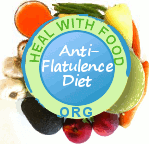Flatulence & Diet: 5 Tips for Reducing Gas With Diet

Are you having trouble with excess intestinal gas, or flatulence in medical jargon? The root of your problem might lie in the foods that are included in your daily diet and in how you eat your food. The link between flatulence and diet is well-established, and adjusting your diet plan can make a real difference in how your digestive system deals with carbohydrates and proteins, the two main gas-causing macronutrients. In this section of HealWithFood.org's Anti-Flatulence Guide, you will learn 5 useful tips on how to reduce excess gas, and the accompanying intestinal discomfort, through dietary modification.
#1: Watch Out for Excessive Amounts of Soluble Fiber
Dietary fiber, the indigestible part of plant-based foods, is essential to the health of the digestive system. However, a high-fiber diet — especially if introduced suddenly — can create excessive gas. Especially soluble fiber (the kind of fiber that dissolves in water in the intestines) seems to promote flatulence. This type of fiber is found in high amounts in peas, beans, apples, carrots, barley, and psyllium. Insoluble fiber, which passes the intestines largely intact, causes less intestinal gas.
#2: Consider Cutting Down on Foods Rich in Raffinose Oligosaccharides
If you want to avoid flatulence, it may be a good idea to limit the intake of foods high in raffinose oligosaccharides. Raffinose oligosaccharides are a group of complex carbohydrates that have properties similar to soluble dietary fiber, including the ability to resist digestion and cause gas in the intestines. The gas-forming properties of beans are largely attributed to the high amount of water-soluble oligosaccharides found in beans. Other foods that contain significant amounts of oligosaccharides include cabbage, peas, lentils and onions — all commonly known to produce intestinal gas.
While limiting the intake of these foods may help reduce flatulence, it is generally not advisable to completely eliminate them from your diet as they are often highly nutritious and can exert various health-promoting effects. The health benefits of black beans, for instance, are legendary – from superior antioxidant effects to detoxifying properties. Cooking foods that contain flatulence-causing oligosaccharides can make these foods more gut-friendly as cooking breaks down oligosaccharides. Another trick is to eliminate gas forming foods for a short period of time and then gradually add them back to your diet.
#3: Avoid Certain Sweeteners
Here's an anti-flatulence diet tip that may be of particular interest to people who are following a weight loss diet: choose your sugar-free sweeteners carefully, or avoid them altogether. Some sweeteners used to sweeten sugar-free and low-sugar chocolates and candies can cause flatulence when consumed in excess. Monosaccharide alcohols including xylitol, mannitol, and sorbitol are particularly famous for their gas-producing as well as laxative effects. Disaccharide alcohols — such as maltitol — are generally better tolerated, but they also can cause flatulence and abdominal discomfort when consumed in large amounts.
#4: Chew Food Slowly
The foods you choose to eat (or not to eat) play a key role in controlling flatulence. However, how you eat your food also plays an important role in the prevention of flatulence. Every time you eat and drink, a small quantity of air is swallowed. If you eat fast or in a hurry, you are likely to swallow more air. Aerophagia (or aerophagy) is a condition in which a person swallows too much air. If a lot of air is swallowed, not all can be absorbed into the bloodstream and thus some gas can continue its journey through the bowel until it is passed through the anus. If you are prone to passing excess gas, be sure to chew your food slowly and steadily. Also avoid lying down right after eating (wait at least 30 minutes).
#5: Identify Food Intolerances
Here's our final tip for reducing flatulence with diet: find out whether you you have a food allergy or intolerance. Flatulence may be caused by food intolerance or sensitivity, which typically result from an absence or lack of specific chemicals or enzymes needed to digest a certain food. What causes a reaction manifesting itself as increased flatulence in one person, however, may not cause the same reaction in another person. Nevertheless, it is possible to point to some foods that are more likely to cause reactions. These foods and food substances include dairy (lactose intolerance), gluten (celiac disease and wheat intolerance), and fructose (fructose malabsorption). People with food sensitivities have different sensitivity thresholds, which means that some less sensitive people may be able to handle the substance in small to moderate amounts.
An elimination diet can be used to identify which foods and substances a person is sensitive to. This diet involves removing any food or substance that is suspected of causing intolerance from diet for a period of two to four weeks. If, after the elimination period, symptoms have cleared or improved significantly (i.e. reduced flatulence and bloating), the suspected foods and substances can be re-introduced to the diet, one food or substance at a time (the so-called "challenge" phase of the elimination diet). During this phase, the dieter systematically goes through all the suspected allergens, one by one, by consuming a suspect food or substance several times a day and then returning to the elimination diet for a few days. If symptoms re-occur or worsen during these days, the dieter may be allergic to the food or chemical that was re-introduced.
Also in This Guide
New to HealWithFood.org?
HealWithFood.org provides diet tips for preventing and treating over 50 conditions. Click on a condition in the footer of this page, and get info about dietary habits, foods, and recipes that are good for your body. Or, start building up your general nutrition IQ by regularly checking out the daily tips, weekly multivitamin smoothie recipes, and other cool features on the HWF Home Page.Further Reading (Offline)
 (or
Amazon.co.uk
(or
Amazon.co.uk  if you live in the UK).
if you live in the UK).

